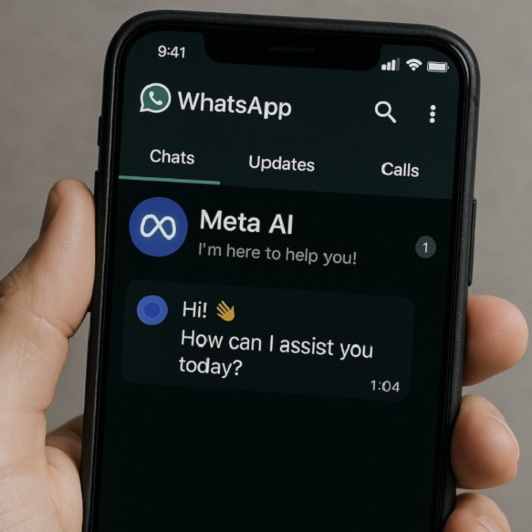
WhatsApp users are pushing back against the forced rollout of Meta’s new AI chatbot, which appears in the app without warning and offers no option to disable it.
Forced AI Integration Leaves Users Fuming
Meta AI, a chatbot integrated into WhatsApp, is being promoted as a virtual assistant that can answer questions and spark ideas, but its uninvited arrival has triggered an outcry. The feature is currently being rolled out in the UK and other countries, where it appears as a glowing blue circle in the search bar or activates when users type “@Meta AI” in chats or groups.
While Meta describes it as a helpful tool powered by its Llama language models, users have taken to social media to voice their frustration. For example, one X user compared the experience to “getting a clingy new roommate”, while another branded it “the most pointless and irritating AI integration into an app so far”. Others said they were switching platforms entirely because of Meta AI.
No Off Switch – And No Clear Explanation
A key frustration appears to be the inability to opt out. Meta has not provided any settings to turn the feature off or hide it, and it hasn’t addressed why users weren’t given the choice. For many, the lack of transparency and consent is as troubling as the AI itself.
It’s been reported that some users have tried switching to WhatsApp Business to avoid the chatbot, and while some appear to have been successful, others have said the blue circle still appears. This inconsistency has also added to the confusion, and Meta has yet to confirm whether WhatsApp Business will remain AI-free.
Other Platforms Too
It seems this isn’t an isolated experiment. For example, Meta AI is being pushed across multiple platforms including Facebook and Instagram, as part of Meta’s wider vision to integrate generative AI into everyday digital interactions. In the UK, it first appeared in Facebook Messenger in late 2024 and is now slowly extending into WhatsApp.
Some Users Say It’s Unhelpful and Intrusive
Beyond the issue of consent, it seems that many simply don’t find Meta AI useful. The chatbot often triggers when users are trying to search for chats or contacts, getting in the way rather than helping. This has left some disgruntled users describing it as “overkill” while others have expressed frustration about being perfectly capable of writing their own messages and not needing AI to write for them.
There also appears to be some scepticism over the chatbot’s actual utility. For example, early testers have reported that the responses are basic, repetitive, and in some cases completely irrelevant. Also, unlike standalone tools like ChatGPT or Google’s Gemini, Meta AI appears hardwired into an app many people use for private and professional communication.
Implications
For businesses that rely on WhatsApp, including customer service teams, delivery firms, and sole traders, the sudden appearance of an unremovable chatbot could create real problems. For example, if a customer sees the AI button and assumes it’s part of the company’s service, they might expect human responses that never arrive. Similarly, internal teams using WhatsApp for logistics or support may be distracted by or accidentally trigger the feature.
The bigger concern, though, may be around trust. For example, businesses increasingly choose platforms based on reliability, privacy, and user control. By pushing AI into WhatsApp without consent or clear controls, Meta perhaps risks undermining that trust, especially among SMEs and regulated industries where transparency and data protection matter.
What Does This Mean For Your Business?
If your business uses WhatsApp to communicate with customers or colleagues, now’s the time to take a closer look at how Meta AI could impact your workflows. The feature might not seem disruptive at first glance, but confusion, miscommunication, or reputational damage could follow if customers or employees don’t understand how it works, or who’s really responding.
Meta’s AI push may be part of a long-term strategy to embed generative tools across its ecosystem, but this backlash shows that users expect more control over how and when they engage with AI. For now, switching to WhatsApp Business might delay the issue but it’s unlikely to be a permanent fix.
In the longer term, this controversy highlights a bigger shift in how users relate to everyday platforms. AI might be coming whether we like it or not but the question is whether companies like Meta will give us a say in how it’s deployed and used.




